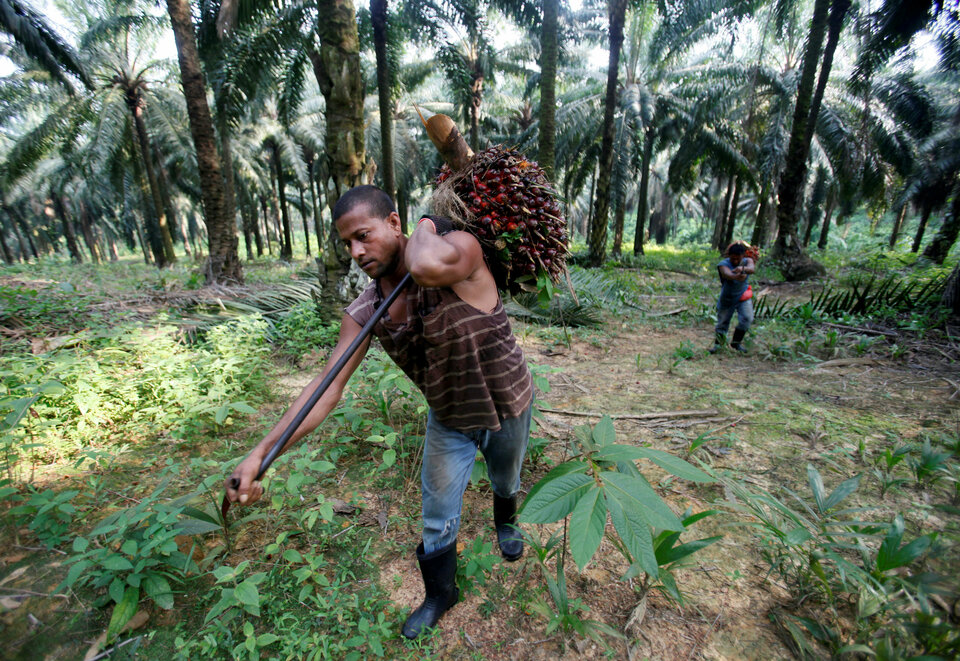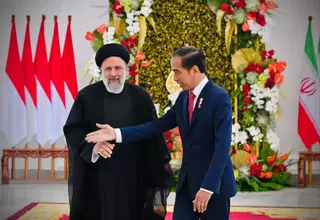Labor Abuses Still Exist at Indofood Plantations: Report

Jakarta. Environmental organization Rainforest Action Network, or RAN, last week called for reforms at Indonesian food giant Indofood, as a new report details ongoing worker exploitation, poverty-level wages and hazardous work conditions at "sustainable"-certified plantations owned and operated by the company.
The report – entitled "The Human Cost of Conflict Palm Oil Revisited: How PepsiCo, Banks, and the Roundtable on Sustainable Palm Oil Perpetuate Indofood’s Worker Exploitation" – revealed grim labor conditions, including exposure to hazardous pesticides, payments below the minimum wage and high risks of child labor.
RAN, Indonesian labor rights advocacy organization OPPUK and the International Labor Rights Forum said their research was conducted at three plantations and included field investigations and 71 worker interviews. All three plantations are located in North Sumatra and are operated by Indofood subsidiary London Sumatra Indonesia (Lonsum).
Lonsum is a listed subsidiary of Indofood Agri Resources (IndoAgri), Indofood’s plantation arm.
Responding to the Jakarta Globe’s request for comment, London Sumatra said the company has complied with existing labor regulations in the country and described their company-labor relations as "harmonious."
"London Sumatra is compliant with labor regulations in Indonesia. As of today, we did not find any industrial relations disputes between labor unions and the company. Our relationship [with the workers] has been harmonious," said Endah Madnawidjaja, London Sumatra corporate secretary and head of legal affairs.
However, the report found that the Indofood plantations have relied on "precarious employment practices," which includes unpaid kernet (unofficial) workers and long-term casual workers, consequently denying them of secure employment, monthly minimum wages and access to benefits.
"Indofood practices wage theft through non-payment of minimum wages, externalizing production costs to workers, making unfair deductions to workers’ wages and not paying workers for overtime," the report said.
These labor abuses are documented on plantations that have been certified as "sustainable" by the Roundtable on Sustainable Palm Oil (RSPO) – the leading certification scheme in the palm oil industry.
According to OPPUK executive director, Herwin Nasution, RSPO "must hold its members accountable."
"The RSPO cannot continue to certify labor abuse, ignoring the plight of workers who face such unique risks," Herwin said, as quoted in a statement issued by RAN on November 28.
He called on the RSPO to "act on the complaint filed against Indofood" and "strengthen both its criteria and auditing systems" as part of an effort to ensure protection for the workers and to have "truly ‘sustainable’ palm oil."
RSPO was contacted by the Globe but did not respond to a request for comment.
According to the report, top financiers of Indofood – including Bank Central Asia (BCA) – "have made no public commitment to address the negative impacts of Indofood or the wider palm oil industry."
BCA lent a total $557 million to Indofood and its subsidiaries, the report said.
Responding to the Globe's request for comment, the bank issued a statement saying that its decision to provide loans was based on "principles of caution" under predetermined criteria and requirements covering aspects of 5C – character, capacity, capital, collateral and condition.
"[Our decision] also ascribes to existing government regulation and legislation related to the environment," the statement said.
Exposure of labor abuses on Indofood-owned plantations was first revealed to the public in June 2016, but the most recent report shows that "conditions on the plantations remain largely the same."
"It is past time that those connected to these labor abuses act, or be remembered as those that condoned egregious worker exploitation all for cheap palm oil," Robin Averbeck, agribusiness campaign director at RAN, said.
Indofood is one of the largest palm oil growers in the world, and the biggest food company in Indonesia.
The food giant has a joint venture partnership with PepsiCo, one of the leading global food and beverage companies, and is the sole producer of Pepsi-branded snack foods in the Southeast Asian country.
Eric Gottwald, legal and policy director at ILRF, called on PepsiCo to "do better."
"PepsiCo prides itself on setting high sustainability goals, but can it truly say that labor abuses are ‘sustainable’? It must take responsibility for the actions of its joint venture partner Indofood by bringing it into line with human and labor rights norms, or cut its ties. Inaction is no longer an option," Gottwald said.
PepsiCo has made commitments to source 100 percent physically certified sustainable palm oil by 2020. It has currently reached 16 percent of this target, and expects the figure to rise to 30 percent by the end of 2017.
The American multinational corporation responded to the Globe’s request for comment via email, in which they reaffirmed their commitment to take reports of non-compliance with their human rights and environmental policies "extremely seriously," and said they have made "significant efforts" to resolve the abuse allegations associated with IndoAgri, "despite having no contractual relationship" with them.
PepsiCo said that RAN "has refused to participate in an open discussion with RSPO and IndoAgri to address these allegations."
Averbeck refuted PepsiCo’s claims on their refusal to meet, and said that "RAN continues to be open to engagement with both Indofood and PepsiCo."
The report showed that RAN and Rainforest Foundation Norway have made "repeated requests" to meet with Indofood and IndoAgri to discuss a responsible palm oil policy since October 2015.
"Indofood does not accept the request to meet, denies key report findings and threatens legal action," the report said.
Averbeck emphasized that both Indofood and PepsiCo must first "acknowledge the legitimate findings outlines in both reports on labor violations."
Tags: Keywords:POPULAR READS
President Jokowi Urges Global Restraint as Tensions Rise in the Middle East
President Joko "Jokowi" Widodo emphasized the importance of diplomatic efforts to prevent the escalation of conflict in the Middle EastKPK Identifies Sidoarjo Regent as Suspect in Corruption Probe
KPK has identified Ahmad Muhdlor Ali as a suspect in a corruption case involving the Sidoarjo Regional Tax Service AgencyEconomic Concerns Overshadow Security Worries for Indonesians in Iran
Indonesian citizens currently in Iran are more concerned about rising inflation than the security situation in the country.'Siksa Kubur' Review: Indonesian Horror with Solid First Act
The beginning part of "Siksa Kubur" is incredibly solid across many fields, including the visual storytelling.IDX Slides 2 Percent as Geopolitical Conflict Rattles Market Confidence
The IDX attributed the subdued performance of the index at the start of the week to the escalating geopolitical tensions in the Middle EastPopular Tag
Most Popular






















